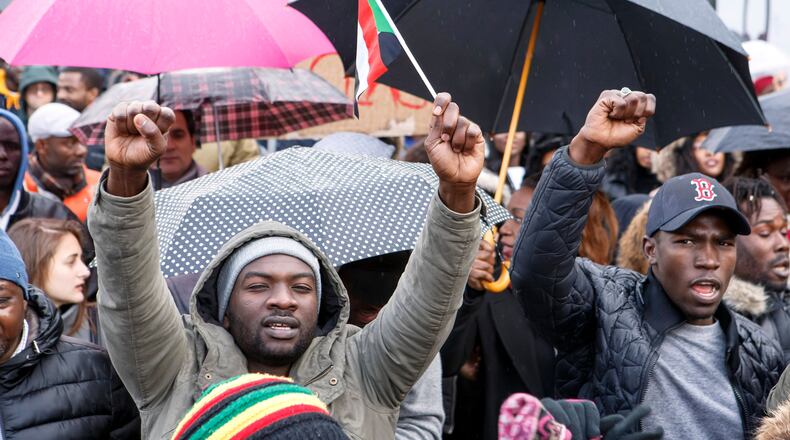Within the last several days, Libya has been cast into the spotlight after footage of an apparent slave auction was released online.
CNN uploaded the video, which was recorded with a hidden camera phone, as a part of an exclusive report "People for sale" published earlier this month.
The article detailed the stories of migrants, who were captured by smugglers and sold into slavery, as they attempted to travel to Europe through Libya in search of a better life.
When the article hit the web, many, including celebrities, responded with outrage, calling on organizations and governments to intercede.
Hearing of the slave trade in Libya for the first time? Here’s what you should know.
Why are people being sold into slavery in Libya?
Each year, tens of thousands of people take the trek through Libya in an attempt to reach Europe, according to the International Organization for Migration. Many are fleeing from conflict or economic troubles in hopes of finding better opportunities abroad.
But after Libyan officials recently passed new rules to tighten border security, several refugees and migrants have been stuck. Smugglers are using the opportunity to sell them into slavery, for up to $800 U.S. dollars, instead of rowing them to safety as they initially promised, CNN reported.
The IOM called the passage from Libya to Europe the "world's deadliest" in a recent study, revealing that "at least 33,761 migrants were reported to have died or gone missing in the Mediterranean between 2000 and 2017 (as of June 30)."
Why is this allowed?
Shortly after the death of former Prime Minister Moammar Gadhafi in 2011, political power in Libya has been split between three governments, according to the European Council of Foreign Relations, leaving room for smuggling networks to develop throughout the country.
The first is the Presidential Council, which has been based in the capital of Tripoli since March 2016. It oversees the Government of National Accord, the sole legitimate executive authority of Libya, and is ran by current Prime Minister Fayez al-Sarraj.
The second is the rival Government of National Salvation, also based in Tripoli. While it disbanded in April 2016, it reformed the following October but no longer controls any relevant institutions.
The third is made up of authorities from Tobruk. However, the European Council of Foreign Relations said it has failed to take the necessary steps to assert itself as an authoritative institution.
Since the political conflict began, more than 150,000 migrants and refugees have crossed over to Europe each of the last three years, the IMO reported, and up to a million migrants are estimated to be in the country.
How long has this been happening?
Slave markets in Libya have remained operational without interruption since 2006, according to the IOM. However, it became public in 2016 after witnesses came forward, and the IMO began repatriating nationals back to their countries two years ago. In 2015, the organization reported successfully returning more than 13,000 migrants and refugees to their homes.
Human slavery, however, is not a thing of the past for many countries. In September, the IOM announced it partnered with the United Nations and several other organizations for a study on the state of modern slavery. After sifting through tons of data and conducting many face-to-face interviews in 48 countries, they found that 89 million people worldwide have experienced some form of modern slavery, whether for a few days or many years, since 2012.
»RELATED: Italy premier in Tunisia to discuss migration, Libya, terror
How has the Libyan government responded to the recent reports of the slave trades?
While the government has not released an official statement, the United Nations Secretary-General Antonio Guterres has called on officials to investigate.
"I am horrified at news reports and video footage showing African migrants in Libya reportedly being sold as slaves. I abhor these appalling acts and call upon all competent authorities to investigate these activities without delay and to bring the perpetrators to justice," he said in a press release. "Slavery has no place in our world and these actions are among the most egregious abuses of human rights and may amount to crimes against humanity...I urge the international community to unite in fighting this scourge."
What can I do to help?
Support the IOM, which is working closely with the UN and Libya to protect people from human trafficking and slavery. The organization releases newsletters frequently, which updates subscribers about its activities.
You can also donate to organizations that help refugees, including the United Nations Refugee Agency, and those that work to combat slavery, like Free the Slaves and End Slavery Now.
Additionally, shop slave-free. Use End Slavery Now's slave-free shopping guide to identify companies that prevent the use of slave labor in its supply chains.
And simply spread the word. Many have recently taken to social media and held protests within the last few days to support the cause.
Want more? Check out Bustle for more ways to help.
»RELATED: Atlanta schools participating in CNN's day to end 'modern-day slavery'
About the Author
The Latest
Featured



